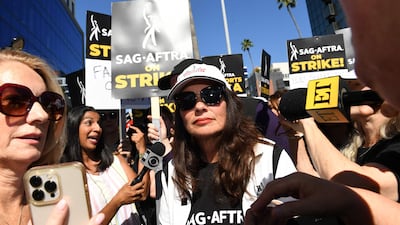A professional musician recently told me of being approached in the street by a neighbour.
They had never spoken before, but out of the blue the neighbour asked if the musician would play at his birthday party, for free.
The musician told me the story with a wry smile, suggesting that those in the creative industries – writers, actors, musicians – are in the only professions in which practitioners are thought to be so in love with what they do that they don’t need to be paid for it.
The Romans spoke of Ars Gratia Artis – or Art for Art’s Sake. That happens to be the motto of the filmmakers MGM, home to money-spinning franchises including the James Bond and Rocky movies. But now MGM and all the big US studios and filmmakers are faced with a major industrial dispute of a kind not seen for decades.
Screenwriters are on strike. So too are on-screen stars and the thousands of lesser-known actors and performers who make the shows we all love.
There are two reasons for industrial action. One is the normal workplace grievance of pay and conditions.
How creative people are rewarded has always been peculiar. Kings and queens historically had in-house musicians, painters and storytellers. Some performers today can make tens of millions of dollars but many more scrape a living with small parts on TV, film and stage. They pay the bills with – in the case of Hollywood – voiceover work, advertising, working as waiters and waitresses and other part-time jobs.
But beyond that traditional industrial dispute over money, there is also a wider fear in Hollywood about artificial intelligence.
Could film and TV scripts be written by a computer? Some TV comedy scripts already sound formulaic, with three or four lines of dialogue followed by canned laughter, and the same rhythm repeated over and over for half an hour each episode.
The Screencraft website gives an idea of basic formulas for screenwriters. It advises that “with film, you're generally telling a story that is contained within the time frame of 90 minutes to more than two hours.
Such a story usually follows a basic three-act structure – or a variation of it – where we see a character thrust into a conflict, struggle through it, and then eventually succumb to it or work their way out of it … With television, you're creating a world with a cast of characters that will hopefully continue on for upwards of 10-24 episodes (give or take) for multiple seasons, thus the main story will not be resolved by the end of each teleplay or television script”.
This is useful creative guidance. It’s based on what already works for successful TV producers and others.
But it is not a huge leap to imagine that such formulas could also work in the scriptwriting equivalent of ChatGPT with a computer program instructed to write a crime drama, a thriller, a sci-fi series or a comedy, followed by instructions that the setting should be a police station, a hospital, or the White House, and the actors should be an AI creation similar to Marlon Brando with Marlene Dietrich and Charlie Chaplin.
How close we may be to this new world is part of the uncertainty that concerns screenwriters, while the on-screen talent are legitimately concerned that actors’ performances, voices and actions by AI could render the real actor surplus to studio requirements. It’s not so fanciful to believe that a young Sean Connery might return as James Bond, or that Jimmy Cagney is reworked for a new, colourised, crime series.
With such complex issues lurking behind the pay dispute, some stars and writers are already predicting that this strike could last until the end of the year. It could blight the launches planned for already-filmed movies and TV series since the stars appear unwilling to promote them.
The union involved is Sag-Aftra, an amalgamation of the Screen Actors Guild and the American Federation of Television and Radio Artists. They say that we stand at “an inflection point for our industry”, although the immediate money question is traditional. It is based on a dispute about “residuals”, which is the amount of money an actor may be paid for repeats of films or TV shows.
Yet the bigger question of who owns the actor’s image if it is reproduced on AI lurks behind the negotiations.
Streaming has already changed everything. The idea of “repeats” is old-fashioned in a world in which films or TV show are always available on streaming services.
As for the impact on the rest of us, the audience, movie goers and subscribers, given the length of time it takes to produce the biggest and best shows, industrial action may not be obvious for a while. But perhaps it might remind us that artists, musicians, writers and actors usually love what they do, but they are professionals who do not want to work for free.
Yes, art is its own reward. But it cannot be its only reward, as my musician friend made clear to the pushy neighbour who wanted a free birthday party performance.












